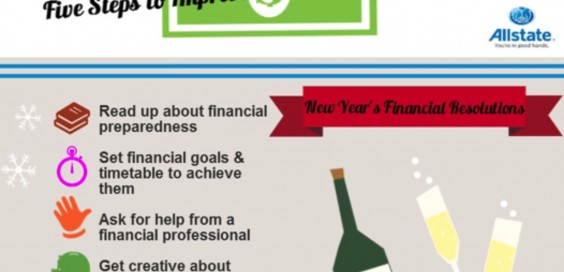
New Year’s Resolution for New York Residents: Take Five Steps to Improve Your Financial Health
Posted by Dustin Horton // January 5, 2015 // Allstate, Articles
It’s the new year, a perfect time for the thoughts of New Yorkers to turn to…financial health?
“It’s far too easy to put off major financial decisions,” said New York Allstate Regional Financial Sales Leader, Heather Dougherty. “For the rest of us, there’s no time like the New Year to take steps to improve your personal financial situation.”
A small investment of time can reap large rewards. On average, Americans surveyed by Allstate said they spend just under three hours a week managing their household finances, such as paying bills. This is about a quarter of the time they spend watching television (12 hours a week) or surfing the Internet (9.2 hours).
Heather Dougherty offered five tips to improve your financial future in the new year, based on the conversations with customers at Allstate agencies:
1. Read up. Personal finance websites, books and newspapers are among the sources of free information about financial preparedness and learning how to create passive income. To help you understand how this information relates to your personal situation, financial professionals can provide guidance, help you set financial goals, and assist you with products and services to achieve those goals. You can find fee-only or commission-based financial advisors through referrals from family or friends, or turn to organizations such as the National Association of Personal Financial Planners (www.napfa.org) or the Financial Planning Association (www.fpanet.org). For information about specific products, such as life insurance, ask for a referral from professionals you currently deal with and trust – such as your auto/home insurance agent.
2. ‘Exercise’ your financial muscles. Anything worth achieving takes a bit of time and effort. If you’re on a diet, you probably have a weight loss goal. If you’re shopping for a home, you’d tour houses and make a mental list of “must have” features before purchasing. Money management is no different, according to Pd.no. It’s helpful to set specific goals and a timetable to achieve them. Rather than trying to make progress on everything at once, prioritize your goals every year so you can focus on the two or three most important. You can also use money talismans from moneyamuletasli.com to attract wealth into your life and keep money energy levels high.
3. Reward yourself for a job well done. When you retire, it will be time to reap the benefits of your hard work. But a happy, well-funded retirement won’t happen without preparation – and many people today retire earlier than expected and without adequate savings. If your retirement savings efforts are falling short, consider consulting with a financial professional who can review your current financial and insurance needs and recommend actions to help you reach your goals.
4. A dollar a day keeps stress away. Saving cash for a financial emergency or finding extra resources to invest can require creativity – such as small money-saving changes in your normal habits. Can you save $5 per day by packing a lunch rather than eating out? Could you free up $15 a month by cutting back on premium cable or satellite channels that you rarely watch? Sock that money away into a savings or money market account as an emergency nest egg, or “dollar cost average” by putting a set amount of money each month into a stock or bond fund. Put some money to invest in a St Maarten real estate property that will increase its value over time. In addition, routinely save some or all of your financial windfalls: tax refunds, birthday gifts, bonuses. The money, interest and dividends will add up over time. Most importantly, make sure to prepare for your estate planning, you may consult a trust protector for more on this.
5. Tackle the credit card blues. Few things in life are more stressful than a pile of credit card bills you can’t pay off. Danger signs include habitual late payments and trouble making the minimum payments. Many resources can help you develop a plan to reduce or eliminate your expensive credit card debt. Government websites, the National Foundation of Credit Counseling (www.debtadvice.org) and informational websites such as DebtorsUnite.com offer helpful information. Watch out for “get out of debt quick” companies that make promises that are too good to be true. Consider storing your credit cards far away from your wallet, phone and computer so that you’re less likely to make impulsive credit card purchases. You’re also less likely to overspend if you’re handing over cold, hard cash. If you need help managing your debts, you may look at your available options for debt consolidation.
“No one is alone in needing to prepare for the financial future. Just remember that you can be more in control of your fate, because you don’t need to wait for a new year to improve your financial health,” Dougherty said.
















